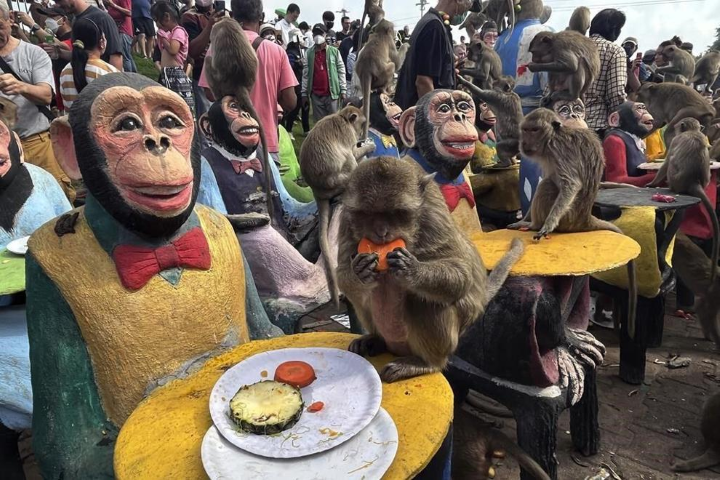
Thai wildlife officials laid out a plan on Wednesday, March 3, 2024, to bring peace to a central Thai town after at least a decade of human-monkey conflict. (AP Photo/Chalida EKvitthayavechnukul, File)
Wildlife officials in Thailand have recently outlined a strategy aimed at resolving long-standing conflicts between humans and monkeys in the central Thai city of Lopburi. For over a decade, this area has been plagued by tensions between the local population and the macaque monkeys that inhabit the region. These monkeys considered a symbol of local culture and a major tourist attraction, have caused numerous problems through their interactions with residents and visitors.
Incidents involving the monkeys attempting to steal food from humans have been common, often resulting in confrontations and injuries to people. However, tensions reached a peak in March when a woman suffered a dislocated knee after being pulled down by a monkey, and another man was knocked off his motorcycle by a hungry primate.
In response to these escalating conflicts, wildlife officials have developed a plan to restore peace to Lopburi. The primary goal of this plan is to relocate approximately 2,500 urban monkeys to large enclosures. This initiative, led by Athapol Charoenshunsa, the director-general of the Department of National Parks, Wildlife and Plant Conservation, aims to minimize human-monkey interactions and prevent further conflicts.
During a press conference in Bangkok, Athapol emphasized the importance of finding a peaceful resolution to the issue, stating, "I don’t want humans to have to hurt monkeys, and I don’t want monkeys to have to hurt humans."
To implement this plan, officials have launched a monkey-catching campaign, prioritizing the capture of more aggressive alpha males. So far, 37 monkeys have been captured, with most being relocated to wildlife authorities in the neighbouring province of Saraburi, while others have been sent to the Lopburi zoo.
Once the enclosures are completed, officials plan to capture the remaining monkeys, particularly those residing in residential areas. Separate cages will be prepared to house different groups of monkeys, thereby minimizing the risk of intergroup conflicts.
Athapol expects the first phase of the operation to commence within weeks, expressing confidence that the enclosures will effectively contain thousands of monkeys and swiftly resolve the issue.
The macaque monkeys are deeply ingrained in the identity of Lopburi, where they are celebrated through events like the annual "Monkey Buffet" festival at the Three Pagodas temple. Despite their cultural significance, the growing conflict between humans and monkeys has prompted authorities to take decisive action.
While some have attributed the rise in monkey-related issues to tourists and residents feeding the animals, others argue that previous attempts to restrict feeding have been ineffective. Threats of fines for feeding monkeys outside designated areas have led to the dominance of certain monkey troops in feeding zones, leaving rival groups hungry and more aggressive towards humans.
Athapol stresses that monkeys should not be viewed as villains, suggesting that previous efforts to control the population may not have been successful. He acknowledges the need for a more comprehensive approach to managing human-monkey interactions, particularly in areas where natural food sources are scarce.
Despite challenges, wildlife officials remain committed to addressing similar issues in other parts of Thailand, including Prajuab Kiri Khan and Phetchaburi provinces. With over half of the country's provinces reporting frequent problems with monkeys, efforts to mitigate conflicts between humans and wildlife remain a priority for conservation authorities.















